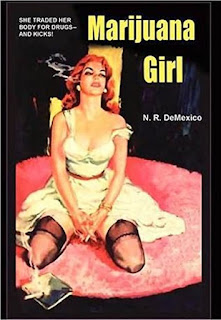Marijuana Girl by N.R. de Mexico (a pseudonym used by Robert Campbell Bragg) was published by Uni-Books in 1951 and re-issued by Beacon Books in 1960. The book was the centre of some controversy, being singled out for condemnation by a congressional committee on pornography as the kind of book that would encourage innocent American youngsters to rush out and become drug addicts.
What really angered the moral watchdogs was the totally calm and non-hysterical tone of the novel. If you were going to deal with drugs and sex you were supposed to make it clear that drugs and sex led inevitably to misery, ruin and early death. The only acceptable tone was rabid hysteria.
But there’s no hysteria in this novel. Some of the characters use marijuana but they don’t consider it to be a big deal and it doesn’t seem to cause them any real problems. Some of the characters use heroin and that does cause them problems. It is not necessarily the end of the world. The novel doesn’t push the official line that one taste of heroin and you’re a hopeless junkie. There’s even a vague suggestion that for people who have the money for their habit it isn’t a problem.
Even more shocking is that the heroine of the story has sex with more than one man to whom she is not married. She eventually becomes a prostitute but that’s where the book really outrages the moral watchdogs - she’s a prostitute but she’s still a nice girl and she’s still a worthwhile person and she isn’t doomed to a future of misery and degradation. Prostitution is just something you do to make money. It doesn’t have any effect on your moral worth as a person. And it’s like any other job. If you grow tired of it you look for an alternative.
So this is a novel which was certainly promoted as a sensationalist expose of vice and sin but it actually takes a very calm and reasoned and balanced and completely non-judgmental view of certain social problems and it even dares to suggest that some of these social problems aren’t really problems at all.
The fact that the heroine gets introduced to drugs by black jazz musicians in New York undoubtedly contributed even further to the hysterical attacks made on the novel.
While there was plenty of moral hysteria in 1951 the juvenile delinquent hysteria was only just beginning to emerge. Marijuana Girl does have some affinities to the juvenile delinquent scare genre. Joyce, the heroine, has always been rather rebellious and her teachers have always feared that her defiance would lead her into wickedness. Things come to a head when Joyce performs an impromptu strip-tease in the school gymnasium. The school cannot tolerate the presence of such a depraved wicked girl and Joyce is expelled.
Joyce, in typical juvenile delinquent style, doesn’t care about being expelled. She gets herself a job with a local newspaper. The editor, Frank, is almost old enough to be her father but he’s from New York and he has the kind of big-city sophistication and intellectualism that Joyce inevitably finds very attractive. Frank is married and Joyce has a boyfriend (Tony) with whom she is sleeping but they drift into an affair.
The problem for Joyce is that at seventeen she is scarcely capable of dealing with one emotional entanglement let alone two. She can’t choose between the two men in her life. Frank can’t make a decision either - his wife doesn’t mind if he has affairs as long as they don’t get out of hand but she thinks this affair is getting a bit too serious. Tony is almost as young as Joyce and he’s a nice enough guy but not mature enough to deal with the situation. The stresses build up for Joyce and she turns to heroin.
The title of the novel is pretty misleading since marijuana plays a very minor role in the story. It would have been more accurate to call it Heroin Girl.
The author has a few odd stylistic tics but it’s possible that these were part of an attempt to give the book a hip feel. The major subject matter of the book is the emerging jazz-beatnik subculture, which would in the fullness of time become the Counter Culture. It’s a subculture which doesn’t yet see itself as being at war with conventional conservative society but definitely is starting to see itself as standing apart from mainstream society. Jazz, drugs and sex were ways in which to express that sense of apartness.
Marijuana Girl doesn’t fit neatly into the crime, noir or sleaze genres that dominated the paperback originals market in the 50s. It’s more of a melodrama. While the book does take a sceptical look at the conventional social and sexual mores of its era it avoids heavy-handed political messaging. It’s a book worth reading for quite a few different reasons and it’s fairy entertaining. Recommended.


No comments:
Post a Comment